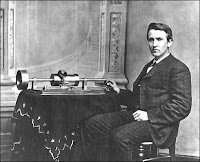This little blog is a way to keep track of useful, specific patent information in this rapidly changing world. It's not actual legal advice, however. Use at your own risk.
Tuesday, March 15, 2011
Ex Parte Moncla - BPAI Opinion
This pecedential expanded board opinion of the Board of Appeals and Interferences would be interesting, but no reasoning is presented. Basically claims were rejected under both 102 and 103 by the Examiner. The board reversed, but does not explain why. I hope this is not a precedent as I find it quite useful to see the board's reasoning.
Sunday, March 13, 2011
I'll show you my affinity if you show me yours.
Microsoft has filed a patent application that allows users of a dating site to indicate hidden interests. A user can then find matches based on these otherwise unseen preferences.
As the patent says:
"For example, an ambitious professional is not likely to divulge that he likes, say, comic books, even though quite true. Appreciably, certain affinities especially those relating to fringe interests, eccentricities, or topics about which there is a common misconception or very little mainstream familiarity or understanding are generally omitted rather than included in conventional descriptions."
I'm guessing this is quite useful for interests for which the acronym 'nsfw' was invented.
The America Invents Act
Patents, like Sergeant Pepper's Lonely Hearts Club Band, go in and out of style. Patents have had a tough go of it lately, what with Orrin Hatch saying "Our patent laws should be in the iPad age, not the sock hop age."
On March 8, 2011, the Senate passed S23, the somewhat cheekily named "America Invents Act," previously and more descriptively called the 'Patent Reform act of 2011'. What do I, unnamed blogger, think? It's a mixed bag. In the really really good column, patent fees will no longer be diverted away from the USPTO, as they have been in the past, creating budgetary problems for the office. A fully funded USPTO is a happy USPTO, filled with happy non-overworked examiners. Yes.
Failure to disclose a "best mode" will no longer invalidate patent claims.
In the 'neutral' column, the act would, eventually, make the patent system "first to file," standardizing the US system with most of the rest of the world, and freeing associates everywhere from hours of prior art searches during litigation.
The bill formerly had a section 18 which would have made business methods more difficult to patent, but thankfully it appears to have been removed.
The text of the Patent Reform bill can be found here.
Hyatt v. Kappos or Sec. 145 is more interesting than you thought
The Federal Circult en banc decision in Hyatt v. Kappos 625 F. 3d 1320 concerns a hithertofore obscure section of 35 USC, the 35 USC 145 civil action to obtain patent, which reads, in part:
The short version of the case is that the inventor Hyatt introduced new evidence--never presented to the patent office--during the civil trial. The Federal circuit said "fine."
Here's a copy of all 80 pages of Hyatt v. Kappos via Google Scholar.
An applicant dissatisfied with the decision of the Board of Patent Appeals and Interferences in an appeal under section 134(a) of this title may, ... have remedy by civil action against the Director in the United States District Court for the District of Columbia ....
The short version of the case is that the inventor Hyatt introduced new evidence--never presented to the patent office--during the civil trial. The Federal circuit said "fine."
Here's a copy of all 80 pages of Hyatt v. Kappos via Google Scholar.
Subscribe to:
Posts (Atom)

